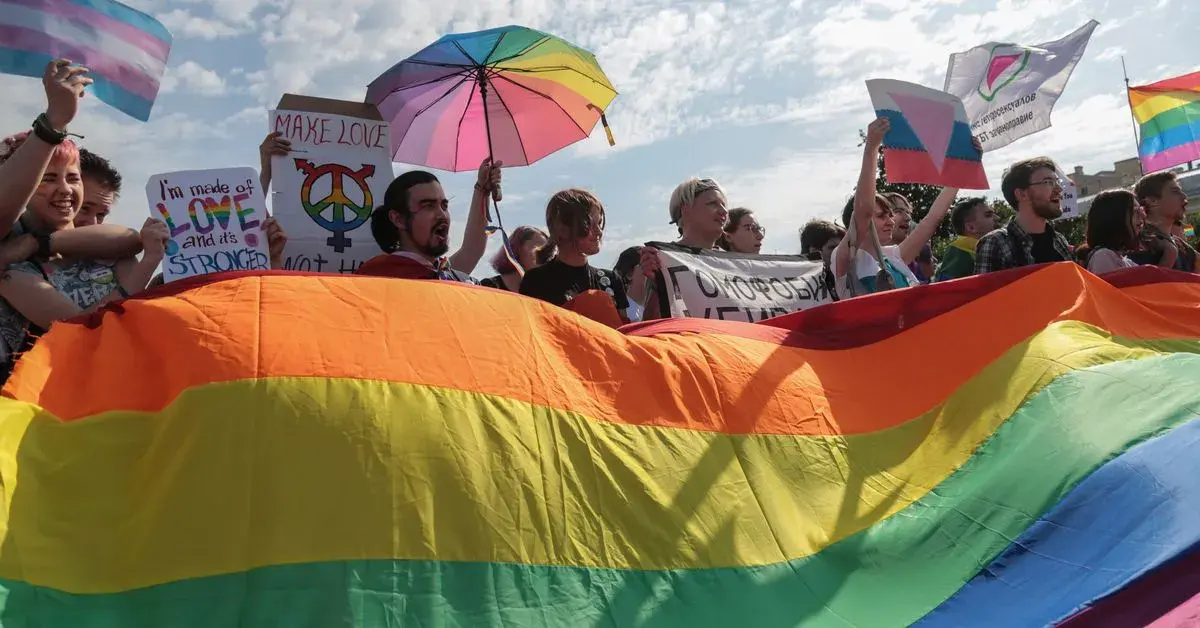Excerpts:
On November 30, Russia’s Supreme Court labeled the international LGBTQ movement an “extremist organization,” claiming that it incites “social and religious hatred.”
The roots of this trend date back early into Putin’s tenure: In 2002, the Russian government adopted the Federal Law on Combating Extremist Activity in the wake of Russia’s wars in Chechnya and the global “war on terror.” Part of its definition of extremism is the “kindling of social, racial, ethnic, or religious discord,” as the court now claims the international LGBTQ movement does.
As Putin consolidated power over the next decade, the anti-extremism law came to be broadly applied to groups or individuals that posed a threat to his power — chiefly, in the words of SOVA, “organizations (whether registered or not) and mass media.” That became clear especially during the “Snow Revolution” of 2011 through 2013, which initially began as protests against Putin’s return to the presidency and parliamentary election results that journalists, civil society organizations, and opposition figures including Alexey Navalny decried as fraudulent.
Following those protests — the largest in Russia since the 1990s — and Putin’s return to power in 2012, the government in 2013 passed a law banning LGBTQ “propaganda,” unrelated to the extremism law. It was, essentially, an apolitical distraction and a nod to the socially conservative sectors that had helped elect him.
Similar to the American right, the Russian political class had begun looking for wedge issues to consolidate their base, Sam Greene, director for democratic resilience at the Center for European Policy Analysis, told Vox in an interview.
“They kind of just [started] throwing stuff at the wall to see what sticks,” he said. And while Russia’s laws surrounding LGBTQ rights were quite liberal and had been since the 1990s, the policy came before the widespread cultural understanding of LGBTQ life and queer identity — so, Greene said, “religion sticks, LGBT sticks.” It also was in line with Putin’s hypermasculine, misogynistic posturing and the lack of visibility and public conversation about sexuality.
And that political posture had real consequences for queer people. The 2013 legislation placed heavy fines on sharing information with minors about “non-traditional sexual relations.” At the time, Reuters reported in 2013, several municipalities in Russia already had similar laws, and anti-LGBTQ violence was becoming an increasing concern for queer Russians.
Since then, Putin’s government has increasingly used legislation as a weapon against LGBTQ people and organizations.
Since Thursday’s ruling, Russian authorities have already raided a number of queer venues including two bars and a bathhouse in Moscow, according to the Associated Press.
“Of course [the ruling] affects people in absolutely terrible ways — it’s part of a violent crackdown that is unleashed by the state and is performed by the state, but also by non-state actors and agents and wider society,” Kondakov told Vox in an interview. “It has an absolutely devastating effect on so many different levels — on a psychological level, but also real violence.”
🤖 I’m a bot that provides automatic summaries for articles:
Click here to see the summary
As part of that project, Putin has worked during his presidency, and over the last decade in particular, to create a narrative of “traditionalist” Russian history and culture that has led to the ongoing war in Ukraine and the exclusion of minorities like LGBTQ people, among other things.
“This is a continuation of a long-established effort that’s been going on for a decade, at least, and that actually already builds upon a whole anti-LGBTQ+ institution in Russia,” said Alexander Kondakov, a Russian sociologist at University College Dublin who studies how the legal and security systems affect LGBTQ life.
“[Anti-LGBTQ] Russian legislation specifically highlights patriotism, strong family, and religiosity (Orthodoxy in particular) as important ‘traditional values’ helping to protect and strengthen the nation,” Radzhana Buyantueva, a researcher studying LGBTQ communities in Russia and their intersection with the political sphere, explained to Vox over email.
Similar to the American right, the Russian political class had begun looking for wedge issues to consolidate their base, Sam Greene, director for democratic resilience at the Center for European Policy Analysis, told Vox in an interview.
The 2013 legislation placed heavy fines on sharing information with minors about “non-traditional sexual relations.” At the time, Reuters reported in 2013, several municipalities in Russia already had similar laws, and anti-LGBTQ violence was becoming an increasing concern for queer Russians.
As Kondakov told Vox, the government’s oppressive anti-gay policy “doesn’t work as well as it used to, and probably they need the injection of homophobia more and more frequently nowadays” to distract people from the Kremlin’s “crisis of legitimacy” over the unsuccessful and unpopular war and increasing isolation from the rest of the world.
Saved 82% of original text.


